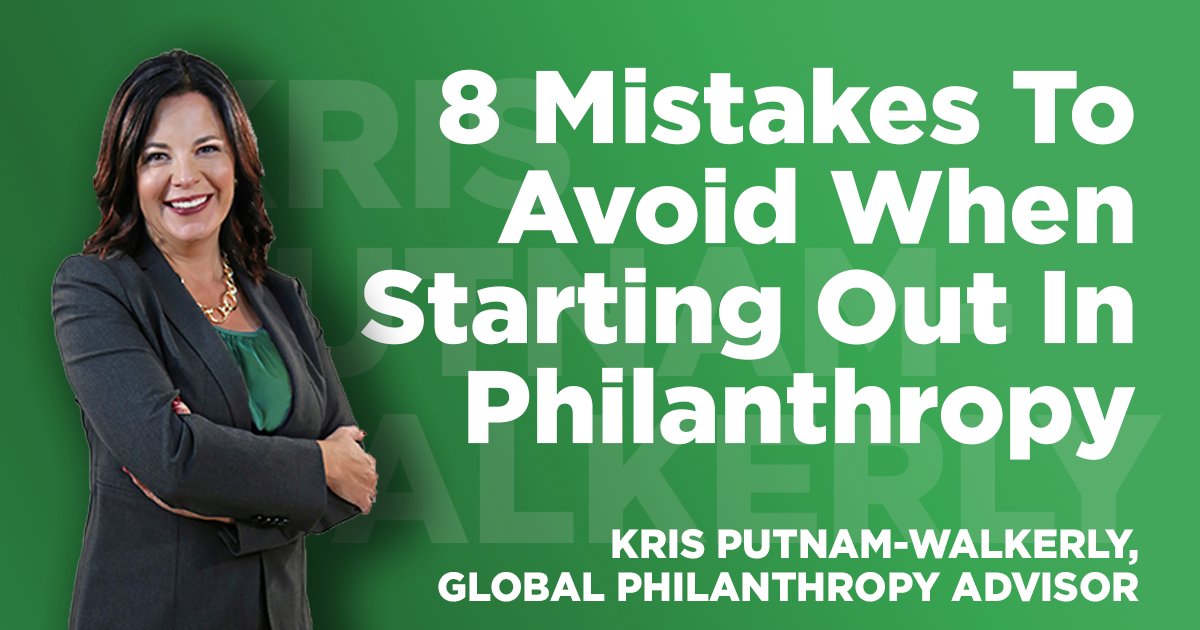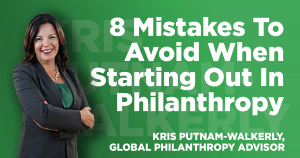How new foundation trustees can have lasting and effective success.
Whether you are launching a new foundation, refreshing your giving strategy, or are a new foundation board member, you want your philanthropy to change the world. Yet you feel unsure how to tackle complex social problems and wonder if you have what it takes to make a difference. It’s vital for new foundation leaders to determine your goals and implement your strategy without becoming mired in a culture that stifles effectiveness.
To help educate and guide foundation boards toward early and lasting success, I have compiled a list of eight common mistakes foundation trustees often make — and how to avoid them.
1. They make the simple complex.
Too often in philanthropy, we make the simple complex when we should be making the complex simple. Many new foundation trustees assume that complexity is a means to ensure stewardship, fairness or inclusion, but often all complexity really does is create chaos and frustration. For any foundation practice or process — from how you make grants to how staff prepare for a board meeting — ask yourself, “Is this approach really going to provide benefit for our operation? What is the simplest way we can accomplish our objectives?” Just because another foundation is doing something in a complex way doesn’t mean you have to. Let common sense be your guide and do what is most useful to you!
2. They manage instead of govern.
Remember, the role of a board is to govern — to clarify the mission and vision, set strategic direction, set policy and provide financial stewardship. One of the best things you can do to ensure the health and effectiveness of your foundation is to let your staff do their jobs. Avoid the temptation to manage staff or micromanage staff leadership. It’s your job to create the foundation’s vision and plan, and your staff’s job to implement it.
On the other hand, don’t forget to make sure your services, wisdom or expertise are available when staff request it. Be prepared and aware that there may be times when your board may need to roll up its sleeves and be a working board in addition to a governing board.
3. They operate with a poverty mentality.
In my opinion, one of the worst things a board can do is confuse thrift with stewardship (or austerity for efficiency). Saving money is not the same as growing it. (If it were, we wouldn’t have the stock market.) A poverty mentality means not investing in your foundation’s internal resources for growth and development, and consequently stunting the growth and abilities of your organization. For example, I know of one foundation that did not allow staff to use its laptops on business trips for fear of theft, which meant program officers lost days of productivity when traveling.
Foundations with an abundance mentality understand that dollars and time invested in training, technology, creativity, capacity, relationship building and professional development make their operations more efficient, intelligent and effective for the communities they serve.
4. They fail to learn.
The opportunity to expand your knowledge doesn’t stop with what you have to know. Consider all of the aspects of governance, visioning, planning, collaborating and grantmaking that you want to know. If your foundation focuses on a particular interest area, such as education or social justice, consider all the content knowledge that is out there that could greatly enhance your work, your effectiveness and your ultimate satisfaction as a grantmaker!
There are many ways available to learn as a board member: conferences, trainings, reading, conversations and consultations with experts. All you need to do is be willing to invest your time and attention. Good boards never stop learning, and great boards embrace the idea of being a learning organization.
5. They misunderstand the power dynamic.
A very real power dynamic exists between a foundation and the nonprofit community it serves. For trustees, that position of power means that people are inclined to be deferential to your opinion, even if they disagree. As a board, you must examine ideas — especially your own — from every angle. Strive to create an environment where your grantees and those who know more about your community needs and opportunities feel absolutely safe and comfortable in sharing their honest and candid opinions and ideas with you.
6. They let it go to their head.
Arrogance, bossiness or condescension on the part of a board member can have devastating effects on relationships between the foundation and nonprofits. Never make the mistake of assuming (or acting as if) the foundation’s assets are your money. Avoid the temptation to play favorites with the causes or organizations you believe in most passionately. And don’t ever invent hoops through which others need to jump to prove themselves worthy of your time or attention.
7. They fail to seek community input.
No matter where your board comes from, there are always people in your community who know much more about issues such as teen pregnancy, substance abuse, mental health and violence than you do. There are also those who truly know what it means to live in a certain neighborhood, or attend a certain school or spend time behind bars. Seek input from the people you are trying to help — about what they experience, what they desire most and what you can do to help.
Gathering community feedback can be as simple as having informal conversations or as formal as hosting focus groups or task forces that include community members. Create an environment where everyone feels comfortable speaking frankly about their views, and be ready to address their concerns in a timely manner to demonstrate that you appreciate their time and willingness to share.
8. They fail to hold each other accountable.
A board is designed to ensure that the will of one does not outweigh the overall judgment of the whole group. However, politeness and decorum often prevent board members from addressing conflict in constructive ways. As a result, boards can become divided, schisms can disrupt the proceedings and vision and goals can get seriously sidetracked. To avoid situations like these, create a policy for airing differences respectfully and thoughtfully — as they arise, and within the confines of a board meeting. Agree at the outset that you will not always agree. Understand that you don’t have to be best friends, but you do have to work together as a cohesive unit.
Fortunately, these mistakes are all avoidable with a little foresight, planning and honest introspection. The success of a new foundation depends a great deal on how seriously you take your role as a governing body and as a community asset and partner. It can seem intimidating, but with the right advice, training and attitude, you can create a lasting legacy for the community you serve.
Adapted from an article originally written for and published by Forbes.
© 2019 Kris Putnam-Walkerly. All rights reserved. Permission granted to excerpt or reprint with attribution.
About Kris Putnam-Walkerly
I’m a global philanthropy expert, advisor and award-winning author. I help ultra-high net worth donors, celebrities, foundations and Fortune 500 companies dramatically increase the clarity, speed, impact and joy of their giving. I’m the author of Confident Giving: Sage Advice for Funders, was named one of “America’s Top 25 Philanthropy Speakers”(along with U2’s Bono!), I write about philanthropy for Forbes.com and Alliance Magazine, and am frequently quoted in leading publications such as Bloomberg, NPR and WSJ.
Whether you are just getting started in philanthropy, want to refresh your giving strategy, or need to catapult yourself to your desired future, I can help. Let’s talk! Call me at +1-800-598-2102 x1, email me at kris@putnam-consulting.com or schedule a call.
How Can I Help?
I serve as a trusted advisor to foundation leaders and high-wealth donors across the globe. My clients report immediate and dramatic improvement in both personal performance and philanthropic impact.
If you or someone you know could use my help, please send them my way. Contact me directly at kris@putnam-consulting.com or call me at +1-800-598-2102 x1 and we can work together to make your giving matter.
__________________________________________________________________________
“The Putnam Team was instrumental in helping shape my big picture ideas into an actionable and sensitive representation of our major rural community health improvement initiative. The wealth of tools and connections they created to tell our story are things that we will use for years to come. We will definitely work with Kris again.”
Allen Smart, Former Vice President, Kate B. Reynolds Charitable Trust
__________________________________________________________________________
Want to learn more? Visit my website to learn how I help funders, access free resources, and read client testimonials.








